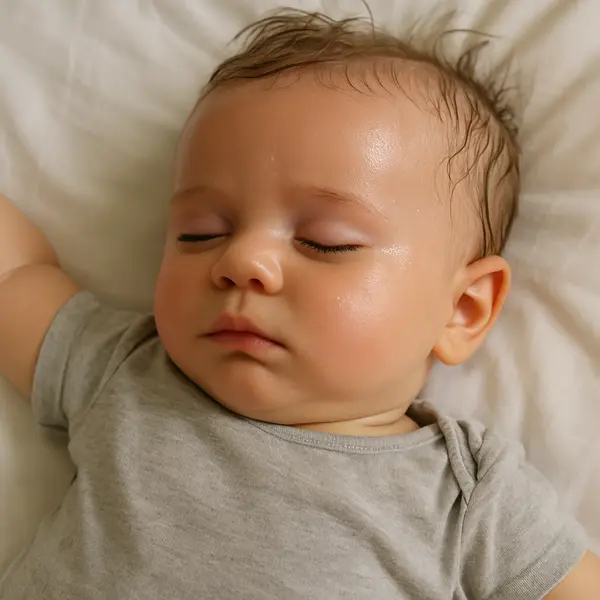Why Does My Baby Sweat While Sleeping?
The Complete Parent’s Guide to Night Sweats in Babies
Understanding Baby Night Sweats
It can be startling for parents to find their baby’s head or body soaked in sweat during sleep. If you’re asking, “Why does my baby sweat from the while sleeping?”, you are not alone. Sweating during sleep is surprisingly common in infants, and in most cases, it’s completely normal.
If you find yourself wondering, why does my baby sweat from the while sleeping?, know that this question is very common among parents and has several possible answers.
Main Causes of Sweating While Sleeping in Babies
Normal Sleep Patterns and Thermoregulation
Babies spend more time in REM (rapid eye movement) sleep than adults. During this stage, their bodies are more active—heart rates rise, and the nervous system is still maturing. This combination often leads to night sweats, especially on the head and face. Immature body temperature regulation is a normal part of early development, which means even healthy babies can sweat more than older kids or adults. For this reason, parents often search for answers to the question: why does my baby sweat from the while sleeping?
Environmental and Clothing Factors
Room temperature, bedding, and clothing have a big effect on sweating. Dressing your baby in too many layers, heavy pajamas, or keeping the room too warm can all cause overheating and night sweats. Research shows that adding extra clothing layers increases skin temperature, so dress your baby for the season and choose breathable fabrics like cotton. When evaluating your baby’s sleep environment, always consider the main question: why does my baby sweat from the while sleeping?
Genetics and Normal Variation
Some babies just sweat more—sometimes it runs in families. If parents or siblings tend to sweat at night, your baby may naturally be a heavier sweater, too. This is generally harmless unless other symptoms appear.
Other Causes of Night Sweating in Babies
Illnesses and Infections
Fighting off a cold, fever, or other infection can increase sweating at night. Your baby’s body may sweat to regulate temperature, especially when breaking a fever. Watch for signs like coughing, congestion, or irritability to help identify illness.
Night Terrors and Sleep Disruptions
Sudden episodes like night terrors can cause your baby to sweat, cry, or breathe rapidly in their sleep. Night terrors are harmless and become less frequent as children grow older. Unlike nightmares, your baby won’t remember these episodes.
Medical Conditions Related to Excessive Sweating
Excessive sweating can rarely be a symptom of a medical issue:
- Sleep apnea: Sweating may signal your baby is working harder to breathe during sleep.
- Hyperhidrosis: This rare condition causes the body to sweat more than necessary.
- Congenital heart disease: Persistent sweating—especially while feeding—may be a sign.
- Hormonal disorders: Problems with the endocrine system can lead to abnormal sweating.
If sweating is accompanied by fever, poor weight gain, difficulty breathing, or blue lips, consult a doctor right away.
How to Keep Your Baby Cool and Comfortable
Optimizing Sleep Environment and Clothing
- Dress your baby in a single layer of lightweight, breathable pajamas—cotton is best.
- Use sheets that regulate temperature and wick moisture.
- Keep the room between 65 and 70°F (18–21°C).
- Avoid unnecessary blankets, hats, or heavy swaddles.
- For infants under 1 year, keep the crib free of loose bedding and toys.
These simple steps can help reduce sweating and keep your baby safe throughout the night. If you continue to wonder, why does my baby sweat from the while sleeping?, adjusting the sleep environment is usually the first and most effective solution.
Recognizing When Sweating Is a Concern
Contact your doctor if your baby:
- Sweats and has fever, cough, snoring, pauses in breathing, trouble feeding, or weight loss.
- Has persistent, unexplained sweating not related to the sleep environment.
- Appears lethargic, unwell, or has blue lips or skin.
Most babies will outgrow night sweats as they develop better temperature control. Still, always trust your instincts—if you’re unsure, reach out to your healthcare provider.
Frequently Asked Questions
Is it normal for my baby’s head to sweat at night?
Yes, babies have more sweat glands on their heads, so it’s common for them to wake up with a damp pillow. Unless there are other symptoms, this is not a cause for concern.
Can night sweats be prevented?
Try dressing your baby in light layers, keeping the room comfortably cool, and avoiding heavy bedding. Adjust as needed for the season or your baby’s comfort.
Should I worry if my baby is sweating while feeding or playing?
Occasional sweating is normal. If your baby sweats heavily during feeding—especially with poor weight gain or rapid breathing—check with your doctor to rule out underlying issues such as congenital heart disease.
Sleep Safety and When to Seek Help
Sleep Safety Guidelines
- Always place your baby on their back to sleep.
- Avoid loose bedding, pillows, or toys in the crib.
- Dress your baby in as many layers as you are comfortable wearing in the same room conditions.
Signs That Warrant Immediate Medical Attention
Contact your healthcare provider if your baby:
- Has trouble breathing
- Develops a persistent fever
- Shows bluish lips, face, or skin
- Appears very lethargic or unresponsive
The following post may interest you
Why Does My Baby Sweat While Breastfeeding?
Why Does My Baby Pull Their Hair Before Sleep?
Sources
The Relationship between Environmental Temperature, Metabolic Rate, Sleep State, and Evaporative Water Loss in Infants from Birth to Three Months
https://www.nature.com/articles/pr1992260
The effects of clothing layers on the thermoregulatory responses to short duration babywearing in babies under 12 months old
https://physoc.onlinelibrary.wiley.com/doi/pdfdirect/10.14814/phy2.14425

